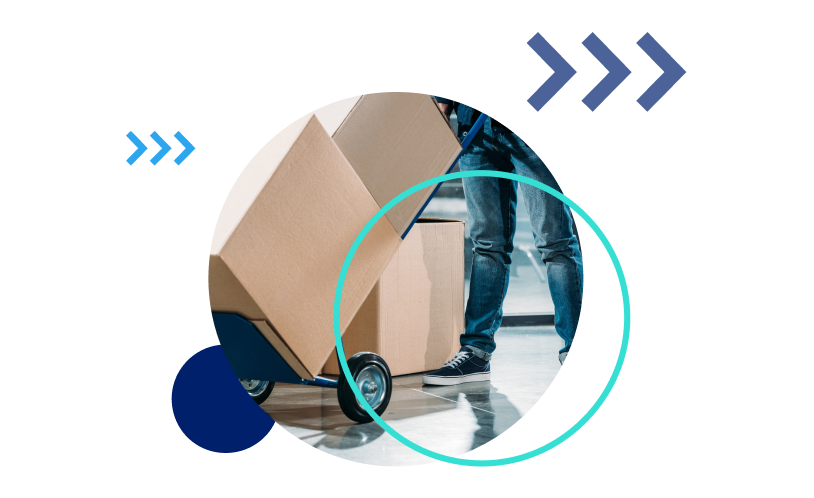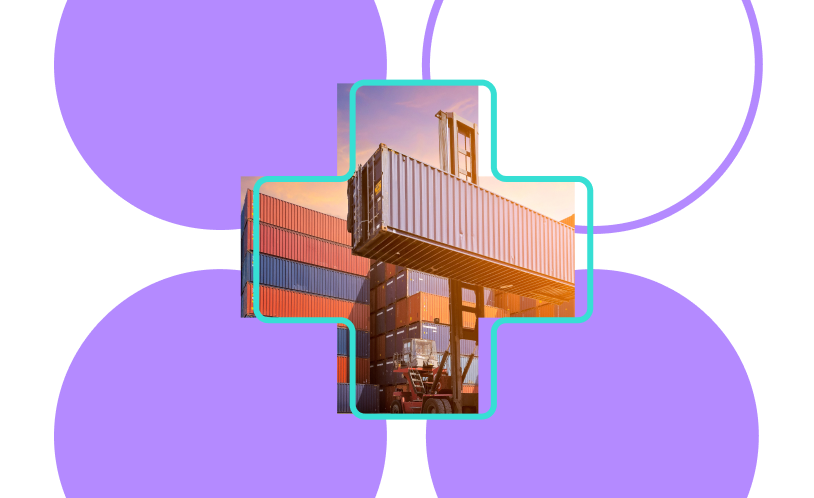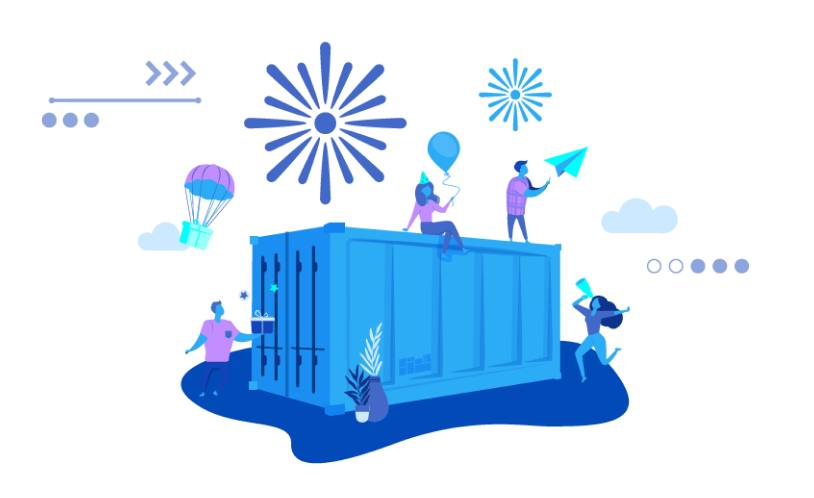In this guide we are taking an in-depth look at various logistics providers in freight shipping to help you decide what you need to keep your freight friction free.
What is a Logistics Provider?
Big shipping companies, like Maersk, typically work with large importers (like IKEA and Target) or importers shipping at least a few times a month. These importers have both high volumes and advanced in-house freight expertise.
If you’re a smaller importer like an e-commerce seller, you probably don’t have the volumes or the freight expertise… and you shouldn’t have to!
Your time and resources are better spent finding the right product, marketing it, getting it to the customer, and building your brand — not calling ports to see if you can get a truck there to pick up your shipment.
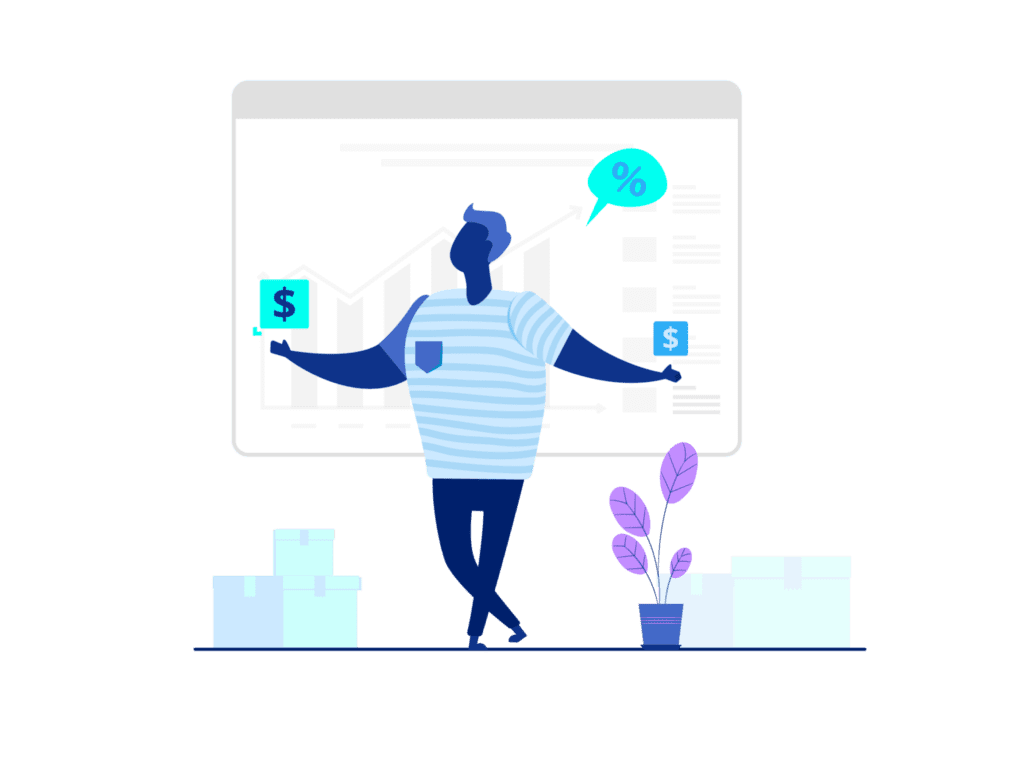
You are likely better off getting freight logistics providers to coordinate different shipment legs, documentation, customs, and communication.
Around 90% of goods sold globally are shipped by ocean. Logistics partners keep things moving smooth.
Once you start looking at bringing logistics partners into your shipping process, you’ll run into a range of options from NVOCCs to customs brokers. These terms are sometimes used interchangeably or overlap, which can be confusing.
We’re going to walk you through the different types of providers to help you figure out who can help you at every step of the process.
Are you ready to book a shipment?
Ocean Carriers
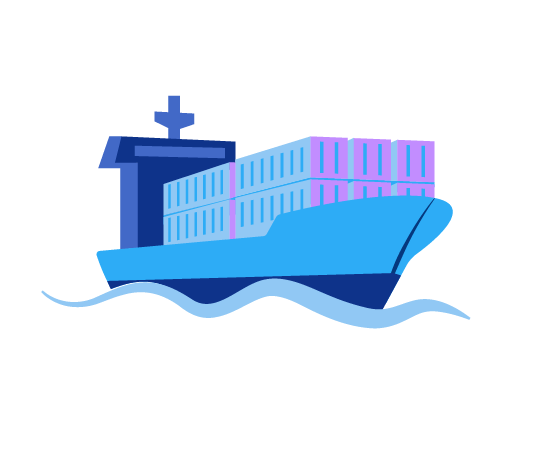
If you import internationally, getting your goods from the factory to destination usually means moving them by ship. The companies that own and operate these ships are known as ocean freight carriers.
‘Carriers’ also describes companies that ship goods by air or land, but for now lets focus on ocean freight carriers since this mode is the most common.
Carriers are legally authorized to transport cargo according to a (very long) list of regulations. These are tied to taxation, the types of goods that can be shipped, shipping routes, and more.
When it comes to ocean carriers, there are two main types — VOCCs and NVOCCs.
VOCC vs NVOCC
VOCC stands for Vessel Operating Common Carrier while NVOCC stands for Non-Vessel Operating Common Carrier.
The two offer similar services and responsibilities, but an NVOCC does not operate the vessel while a VOCC does. Both issue Bills of Lading, register with the Federal Maritime Commission, and assume liability for the goods being shipped.
VOCC (Vessel Operating Common Carrier)
VOCCs are shipping companies that own and operate vessels, and lease them to other entities. These ship operators are responsible for the cargo and for transporting it to the right destination at the designated time.
Most VOCCs work with larger enterprise importers/exporters, so if you’re a small business using an intermediary logistics provider is your best bet.
NVOCC (Non-Vessel Operating Common Carrier)
One type of intermediary is an NVOCC.
This is an ocean carrier that doesn’t own a fleet. Instead, it leases cargo space from ship owning entities, or VOCCs. NVOCCs have the same responsibilities of any carrier, including documentation, collection, transport, and delivery.
Sometimes NVOCCs also operate as freight forwarders.
This expands what services and responsibilities you can expect, so it’s worth asking logistics providers what is included in their quote and whether they also have an NVOCC license.
(Wait… what’s a freight forwarder then?)
Freight Forwarder vs Carrier
Both carriers and freight forwarders track and transport your cargo.
But while carriers are also responsible for your cargo, freight forwarders act as an intermediary between carriers and shippers without assuming liability for the cargo.
Plus, freight forwarders can negotiate with a range of different carriers on behalf of their customers to access better rates and conditions.
Freight forwarders help importers and exporters by dealing directly with carriers, securing capacity, handling documentation, splitting or combining shipments, securing final leg transportation, and more.

Carriers also consolidate and deconsolidate less than container load (LCL) shipments. But freight forwarders handle more details than carriers. Plus, freight forwarders have access to multiple carriers so you get more competitive terms and pricing than dealing directly with one carrier.
Another difference between a freight forwarder and a carrier is that carriers always issue a Bill of Lading and carry responsibility for the cargo during transport.
Freight forwarders, on the other hand, aren’t responsible for losses incurred during transport and receive Bills of Lading from carriers.
Freight Forwarder Services
The global freight industry is complex, to put it mildly.
That’s where freight forwarders can help. These experts connect links in the supply chain, handle port to port logistics, find competitive pricing , and manage transportation so you can focus on growing your business.
Freight forwarder’s services include:
- Securing carrier transport
- Securing additional transport needs based on the incoterm
- Consolidating goods for shipping
- Breaking down consolidated shipments for distribution
- Mediating between carrier and shipper
- Negotiating rates on behalf of client
- Ensuring proper packaging according to domestic or international shipping regulations
- Ensuring correct labeling for international shipping
- Preparing and collecting necessary documents and verifying that they are filed. This can include the Bill of Lading, Commercial Invoice, Certificate of Origin, and Inspection Certificate.
Freight Forwarder vs NVOCC
Logistics providers on Freightos.com are typically freight forwarders that may or may not have an NVOCC license. These freight forwarders are some of the best in the business and stick to standard operating procedures so you know that you’re the best possible service with transparent pricing and instant access to additional services.
Plus, with Freightos.com you know someone has your back.
Customs Broker
Some of the most common questions we see from Freightos.com users are about customs duties and customs brokerage.
When getting a quote for freight, customs is not included. This is a separate transaction involving specific taxes imposed by the government where goods are being shipped to.
How much you will need to pay depends on the goods you are shipping, according to the HS code that they fall under.
[tip title=”What is an HS code?”] The Harmonized System, or HS, is an international standard to classify globally traded products first implemented in 1988. Over 205 countries are signatories, meaning that they have submitted HS tariff codes and duty structures according to the agreed categories. [/tip]
HS codes consist of at least six digits representing different subsections of the product category:

Since duties are calculated based on the HS code, knowing how your products are categorized is really important and can affect your bottom line.
Check out our HS Codes Lookup for quick access to your cargo’s code:
Even if you know your HS code, there are still many complicated requirements to clear import customs properly.
This is where customs brokers can help.
According to the US Department of Homeland Security:
Customs brokers are private individuals, partnerships, associations or corporations licensed, regulated and empowered by U.S. Customs and Border Protection (CBP) to assist importers and exporters in meeting Federal requirements governing imports and exports. Brokers submit necessary information and appropriate payments to CBP on behalf of their clients and charge them a fee for this service.
This is important because customs compliance mean the difference between profit and loss on a shipment.
Some of the things involved in customs include trade regulations, restrictions, tariffs, and insurance. With a customs broker involved, you’ll have confidence that any paperwork or payments are taken care of, saving you time and potential penalties.
There are customs brokers that also act as freight forwarders, which means that they are licensed and trained to handle customs liability and also help coordinate and execute freight shipments on your behalf.
Some freight forwarders work with in-house customs agents, so you may not need a customs broker of your own. But if your freight forwarder is not also a customs broker and doesn’t include customs brokerage as an added service, you will be responsible for getting everything in order.
On Freightos.com, many of the freight forwarders on the platform offer customs services as an add on. When searching for a freight quote, just select the “Customs & additional services” option and fill in any relevant information:
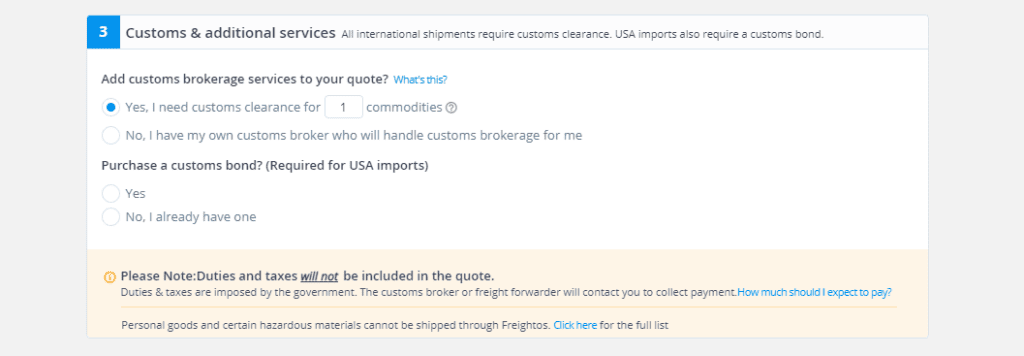
Third-Party Logistics
The final link in the shipping supply chain is third-party logistics, or 3PL.
These logistics providers fill in any gaps in the transport, distribution, storage, and delivery of imported or exported goods.
Once your goods arrive at the port, or to a destination warehouse, many freight forwarders are done with their part. 3PL providers can take over handling, storage, warehousing, and order fulfillment.
Your 3P logistics partner can also help with repackaging and labeling deconsolidated shipments, making sure that the right items get to the right place at the right time. Plus, 3PL providers can handle returns.
Freight Forwarder vs 3PL
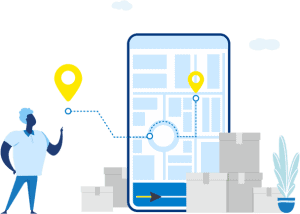
Freight forwarders coordinate the shipment of goods from origin to destination on behalf of importers and exporters.
The range of services offered by freight forwarders focuses on the main leg of transport and includes negotiating rates, booking space, preparing documents, getting goods from the factory to the port of origin, and handling insurance. Some freight forwarders also take care of customs clearance.
3PLs offer a wider variety of services, especially once your goods have arrived at their destination.
But there is overlap between freight forwarding and third-party logistics.
Freight Logistics Management
Just like some freight forwarders hold an NVOCC license and can deliver more services to shippers, some freight forwarders also offer a wider range of 3PL solutions to meet your customers’ needs. Same day delivery, easy returns, and other value-added features will keep you ahead of the competition.
If end-to-end shipping and freight logistics management is something you’re looking for, check what additional services are available from your freight forwarder. You may find everything you need in one place, saving time, hassle, and money.
